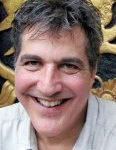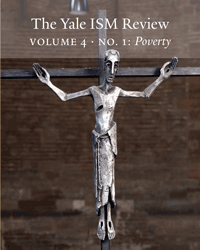Ron Jenkins
In his memoir, Survival in Auschwitz, Primo Levi recalls the day when he struggled to remember a passage from Dante’s Inferno. He and a French prisoner were carrying a hundred-pound pot of soup suspended on a pole. As they walked Levi felt compelled to recite the “canto of Ulysses.” He is frustrated by his inability to recall a particular tercet accurately. When the words come to him, he is overcome with emotion.
Remember your birthright
You were not made to live like brutes
But to pursue wisdom and virtue. (Dante’s Inferno, canto 26, lines 118–120)
Levi recalls the moment “like the blast of a trumpet, like the voice of God. For a moment I forget who I am and where I am.” His fellow prisoner was equally moved. “Pikolo begs me to repeat it. . . he has felt that it has to do with him, that it has to do with all men who toil, and with us in particular, and that it has to do with us two, who dare to reason of these things with the poles for the soup on our shoulders.” (Survival in Auschwitz by Primo Levi; New York: Simon and Schuster, 1959, 211).
“Many of us aspire to escape from our own dark forests to better places. In prison the need is more urgent.”
I have spent much of the last decade listening to incarcerated individuals read and reimagine Dante’s Divine Comedy in prisons from New York’s fabled Sing Sing to Indonesia’s notorious Kerobokan jail to the Sollicciano prison in Dante’s home town of Florence. Like Levi, the men and women I meet in prison temporarily forget where they are when they immerse themselves in Dante’s poem. The medieval epic inspires them to write about their own voyages from past hells to future heavens. People behind bars identify with Dante for the same reasons that anyone might who takes the time to reflect on the poem. Many of us aspire to escape from our own dark forests to better places. In prison the need is more urgent.
For several years I have been bringing Yale students to prison to listen to incarcerated men reimagining Dante’s poem on their own terms. My course, “Performance Behind Bars,” is hosted by the Institute of Sacred Music, but students sign up from all over the University, from the Drama and Business Schools to the Schools of Music and Public Health. Undergraduates also enroll.
One semester we chose Ulysses’s speech as a point of departure. Jennifer Donelson, a specialist in medieval music from Saint Joseph’s Seminary of the Archdiocese of New York, set part of the Italian text to a Gregorian chant so that the Yale students and their incarcerated collaborators could sing together as a first step in entering Dante’s world. They chanted the tercet that Levi found so compelling, “Fatti non foste a viver come brutti/Ma per seguir virtute e canoscenza.”
The Italian language of these lines was foreign to them, but like Primo Levi, men living in a Connecticut maximum security prison found it easy to relate to characters who refused to live “like brutes” and chose instead to pursue “virtue and knowledge.” Prison in America is a dehumanizing experience. Incarcerated individuals have their names replaced by a number and often feel that their humanity is erased by the stigma associated with the label of “convict.”
“Their stories from the past were grim, but their dreams of paradise were touchingly simple: hearing the laughter of their children, hugging a loved one, attending a family barbecue.”
At first, the incarcerated men in our course were wary of Dante’s medieval epic, but as the weeks passed they enthusiastically followed the poet on his journey from Hell through Purgatory to Paradise, and found many parallels to their own life stories. They were particularly impressed to learn that Dante, like them, was a convicted criminal, and had written his masterpiece under a sentence of death, exiled from his home and family. Dante underwent a profound transformation during his journey and men in prison are also in the process of transformation. Sometimes the changes experienced in prison are for the worse, but the men who had chosen to be in our class were determined to emerge from incarceration better than they had come in. Reading about Dante’s journey became a catalyst for re-examining the hells they had lived through and the heavens they hoped to find in the years ahead. Their stories from the past were grim, but their dreams of paradise were touchingly simple: hearing the laughter of their children, hugging a loved one, attending a family barbecue.
The final performance script wove together the words of the incarcerated students and fragments of Dante’s poem. Their overlapping stories demonstrated the lasting relevance of the medieval text. Lines from the opening passage of Dante’s Inferno (here in italic bold) inspired an incarcerated student named Ivan to write the following:
I came to myself in a dark wood, for the straight way was lost.
I came to myself in Level 5 Maximum security, where you find murderers, thieves and gang members, a place of lies and loneliness, manifestations of physical, mental and emotional agony.
And so. . . I lost hope of reaching the heights.
Another incarcerated student named Lawrence was moved by Dante’s discussion of justice in canto 18 of Paradiso and decided to redefine the word in terms that matched his experience as a young African-American man:
Is this “justice” or is this “just ice”?
Only one who has knowledge of self can serve “justice.”
“Just” is the reward, and “ice” is the penalty.
When one is penalized, he or she is served with “just-ice”
meaning to be frozen in a mental state of 32 degrees below zero.
Is this “justice” or is this “just ice.”
Because of the color of my skin I’m a usual suspect.
A drug dealer is what some suggest.
They lock us down for years and use us as test subjects.
Listening to the perspectives of writers like Ivan and Lawrence, Yale students also underwent a transformation. Many had read about America’s criminal justice system, but learning about its flaws first-hand inside a prison provided a deeper level of understanding. Hearing Dante’s poem read and interpreted by men in prison gave them insights into the text’s contemporary relevance that would be hard to duplicate in an ordinary classroom setting. Their goal was to help create a theatrical performance that interwove fragments of Dante’s medieval poetry with the street-savvy vernacular of their incarcerated collaborators. Each semester’s script was completely different from the one before, but the results were always astonishing when they were performed in the prison by the writers for an incarcerated audience. The performances at the Divinity School’s Marquand Chapel were charged with a different kind of power. At Marquand the Yale students performed the scripts written by their incarcerated classmates for an audience that included the campus community and the families of the men in prison. Family members were not permitted to attend the performance in prison, so coming to Yale was their only opportunity to hear the words that had been written by their loved ones.
These long-distance reunions were often tearful as mothers and fathers and brothers and sisters of the incarcerated students heard stories that had never been expressed to them in person. At one performance in the Marquand Chapel a Yale undergraduate was performing the words that had been written by her prison partner, a man named Preach. Preach’s young daughter had died while he was in prison, and Dante’s depictions of parent-child relationships had led Preach to write about parental relationships in his own family. His rap rhythms echoed the propulsive forward momentum of Dante’s terza rima verse form.
My father left me at an early age
Sending me into an early rage
Some of the reasons why I’m in this cageAnd God knew all this? All this was preordained and staged?
What? He’s the author, and I’m some character in the book?
And he’s just turning the page?When I was out in the world I was so godless
About my crime, found guilty on all charges.
I just hung my head low, but my mother took it the hardestNow I’m in prison, hoping my young daughter doesn’t get knocked up
She looking for love in all the wrong places
Daddy’s not there, Daddy locked up.
Sins of the father!
I remember hearing a woman gasp when the student said, “My mother took it the hardest.” I thought the cast had arranged the off-stage interjection as a well-planned sound effect, but I hadn’t noticed it in rehearsal. Eventually I realized that the interjection was not planned. The gasp had come from a woman sitting in the front row of the audience. It was Preach’s mother.
In the post-performance discussion she spoke to the audience through her tears. She said that his living with Dante’s text was the best therapy her son had received in prison while working through the grief of losing his daughter. Her comments suggested that she and the other spectators may have experienced their own form of transformation. “It was very emotional and heartwarming,” she continued, “to see the inmates’ true life stories acted out by the students. It helps me to better understand the part we [parents] played in our loved ones being incarcerated. Yes, even us, the good parents. It was helpful but painful.”
 Ron Jenkins, a recipient of Guggenheim, Sheldon, and Fulbright Fellowships, is a visiting Professor of Religion and the Arts at the Yale Divinity School and the Institute of Sacred Music. This year his Yale students collaborated with formerly incarcerated men on the creation of “A Freedom Oratorio,” inspired by their reading of Dante and performed at Marquand Chapel in New Haven, St. Paul’s Chapel in Manhattan, and the Mott Haven Reformed Church in the Bronx, located in a 1.8 square mile neighborhood where over two hundred children have parents who are incarcerated.
Ron Jenkins, a recipient of Guggenheim, Sheldon, and Fulbright Fellowships, is a visiting Professor of Religion and the Arts at the Yale Divinity School and the Institute of Sacred Music. This year his Yale students collaborated with formerly incarcerated men on the creation of “A Freedom Oratorio,” inspired by their reading of Dante and performed at Marquand Chapel in New Haven, St. Paul’s Chapel in Manhattan, and the Mott Haven Reformed Church in the Bronx, located in a 1.8 square mile neighborhood where over two hundred children have parents who are incarcerated.
A National Public Radio feature on “Performance Behind Bars” can be found at the following link. To hear the voices of the incarcerated men reading their work and discussing what Dante’s poem means to them scroll down and click on the sound cloud. http://wnpr.org/post/connecticut-inmates-emerge-dantes-inferno
